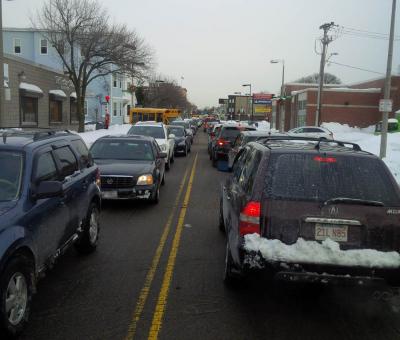February 4, 2015
 Dot Ave — Feb. 4, 2015
Dot Ave — Feb. 4, 2015
Overall, the city of Boston has responded well to the challenges of a suddenly relentless winter season that is testing the resolve and resourcefulness of city dwellers and, especially, its government. Mayor Walsh and his administration have shown that they are up to the job of managing multiple large snow events, but there is still room for improvement in how we – as a city and state – respond in the days after the immediate snow emergency has subsided. And with projections of even more large snow events in the forecast for next week, it’s best that city administrators start tinkering with their systems now.
The mayor wisely cancelled school for three days last week – and for an additional two this week. Although some weary parents may be loathe to admit it, the cancellations proved to be the right call. It was critical to keep the yellow buses from clogging our streets and to keep vulnerable students from danger at bus stops — some of which have still not been properly cleared from last week’s blizzard.
Going forward, the city needs to be more selective and nimble in its approach to the re-opening of main arteries to traffic. When multiple snow events come in quick succession, the city especially needs to give itself more time to clean up adequately before clogging our road system with large vehicles and parked cars on key roadways.
As Wednesday morning’s commute in Dorchester showed, the road system in our neighborhood was ill-prepared to handle the full load of commercial vehicles, buses, and regular commuters that jammed our streets. Dorchester Avenue — never an easy route even in good weather — was an absolute disaster.
The Walsh administration should consider phasing-in main artery parking bans for additional days in the aftermath of major snow emergencies. Crews needed more time than they got to clear our key arteries — most notably Dorchester Avenue and Blue Hill Avenue. The city should also institute restricted travel times on large commercial vehicles — including tractor trailer trucks— that have been further snarling Dot Ave. this week. Such vehicles are not permitted on Morrissey Boulevard due to weight restrictions, forcing many to use the avenue instead. In extreme snow emergencies — such as the one we’re in right now — these vehicles should be kept off Dot Ave. during peak morning and afternoon commute times.
Walsh and his team were dealt an even more difficult hand this week due to a malfunctioning public transit system that has become reliable only in the sense that you can count on it not to work in frigid temperatures. The Red Line experienced extreme delays this week that forced even more people into their cars and onto our roads. This made it even more imperative that city officials impose tighter restrictions on key arteries.
On Tuesday, the mayor urged patience and was up-front about what residents should expect. “It’s going to be a while,” he told reporters. The cost of all of this clean-up is another consideration. Walsh told reporters this week that he expected that the city’s budget for snow removal would be “shattered.”
The public should extend an appropriate level of patience and courtesy to a City Hall team that is clearly working hard to respond to an extreme weather crisis. But, in return, our neighborhoods expect to see on-the-go fixes to the city’s approach as the snow banks mount along with the traffic congestion.
Topics:


